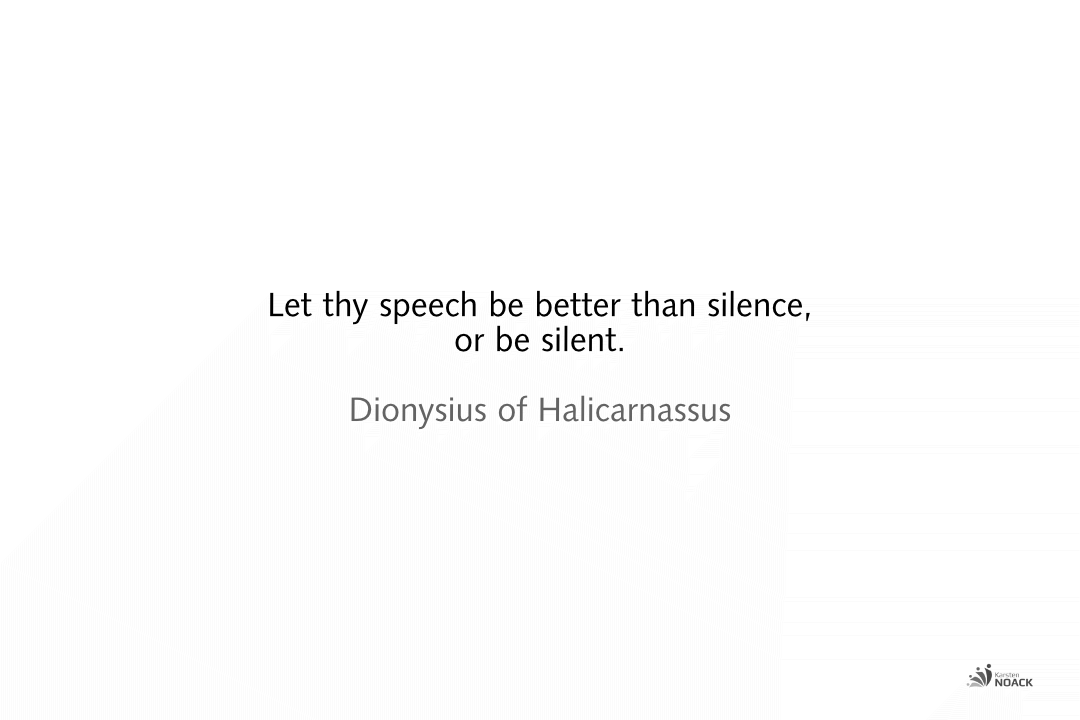When to speak and when to stay silent?
Thoughts of the day*

When to stay silent and when to speak up?
The thought of the day is about the question of when it is better to speak up and when to stay silent. How to know which one is the better decision?
Thoughts about the motto of the day
What comes to my mind when thinking about this motto of the day? It reminds me immediately of the first rule of rhetoric: If you haven’t something relevant to say, shut up! Sometimes, silence is golden. Is there another thought? Yes!
Let me add a few thoughts when I think it is better to stay silent:
- When you have nothing relevant to say.
- In case, it is better to take some time to solidify your reaction.
- When something is better left unsaid.
- You don’t have a receptive audience.
When is it better to speak up:
- When you can make a positive difference.
- You have the power to change something.
- It is the desired opportunity.
- When your opinion is requested.
- If your silence could be understood as an approval for something you disagree with.
- When you want to let your feelings known.
- To demonstrate that you are interested.
*Note
I select the motto of the day mostly because something about it appeals to me. Something attracts me or irritates me. It feels as if it could contain something and I want to get to the root of it. So I dedicate a motto to each day and let myself be surprised what it has to offer me.
Sometimes the reason for the choice clarifies itself only after a while. That's why the thoughts about the motto of the day are often not articles, but associations. They are thoughts transformed into words. They are spontaneous and I also publish them frequently while I am traveling. They, therefore, tend to appear in fragments. Feel invited to add your associations in the comments. Enrich the thoughts with your perspectives – to complete the picture.
How do you benefit best from the motto of the day?
Ask yourself constructive questions like the following and you will personally benefit from each motto of the day:
- What triggers the topic in you?
- Under what circumstances do you agree with the statement and when not?
- What is the significance of the statement for you?
- How can the motto of the day enrich your life?
- In what context could the statement be useful?
- Where and when do you want to remember it and how?
And what can I do if I disagree with a motto? There is often something personal to learn from quotations with which we disagree. Helpful questions in such a case are:
- What do you specifically disagree with?
- Do you think the statement is generally not helpful or only not suitable for you personally?
- Which aspect is worth taking a closer look at?
Just ask me personally
Please post any questions that may be of interest to other readers in the comments. Looking for professional help?
If you are interested in coaching, training or consulting, if you have organizational questions, or if you want to make an appointment, you can reach me best via this contact form (you can choose whether you want to enter your personal data) or via e-mail (mail@karstennoack.com). The privacy policy can be found here.
Transparency is important. That is why you will find answers to frequently asked questions already here, for example about me (profile), the services, the fees and getting to know me. If you like what you see, I look forward to working with you.
Remarks:
In the address bar of your browser, the URL should begin with "https://www.karstennoack.com/...". This indicates a secure connection (SSL). Whether you enter your real name is up to you.
Present the benefits in the beginning of your pitch
There are many strategies to consider in opening your pitch. Think about it twice, because those first minutes can make or break you.
Professional impact analysis: How are you perceived by other people?
How do you actually affect people in conversations, speeches and presentations, in interviews? Professional feedback helps. What insights does an impact analysis offer you?
17 tips for facial expressions in speeches and presentations
This article deals with what it is worth paying attention to as a speaker concerning facial expressions.
Public speaking: Keeping it simple doesn’t mean you’re stupid
One should choose the simplest explanation of a phenomenon, the one that requires the fewest leaps of logic. The more complex something is, the easier we should explain it.
Five fingers for a structured speech. Five-finger speech structure.
The five-finger speech structure step by step. Systematically build up statements, whether for speeches, presentations, or discussions.
Speech anxiety as an obstacle for your career
Stage fright is a common experience, most people know the queasy feeling as well as the sweaty fingers, and that is already unpleasant enough. But what if speech anxiety becomes a career killer?
Just read out speech manuscripts …
There are good speechwriters. But what value has the best manuscript, when the performance is uncharitable? Unfortunately, in the end, the cupcakes are the highlight! An important speech deserves preparation, rehearsals, …
Create an excellent speech or presentation as a masterpiece
Create an excellent speech or presentation. It will bring you forward as a presenter. Every speaker should make a brilliant speech at least once in his life. The effect goes far beyond the event because the experience becomes a mental reference. Such an experience will change you as a speaker. Create your rhetorical masterpiece. Here is how to do it.
Being right at all costs. The price we pay for needing to be right.
Persuading without arguments, assertiveness, winning without consideration, knockout by nasty tricks, black magic, manipulating. It is a coveted feeling to be right.
Grounding for presence and confidence in speeches and presentations
Use grounding for presence and a feeling confident in speeches and presentations. More than just a remedy for stage fright.
15 tips on how to stand up for your conviction: Be brave, speak up!
Some people have an opinion that deserves attention. Often, however, this opinion is not heard. Then it is time to decide whether to keep it that way or to share the point of view more clearly with others. Not everyone dares this step. What about you?
20 tips for humor in speeches and presentations
Do you want the attention of your audience? Humorously move your audience before the seat hurts. Humor relaxes. It resolves tense, stressful situations. Humor has some positive effects. Appropriate humor can be used effectively in many situations. Find out what is worth paying attention to.
This article is a short excerpt from the more comprehensive course materials my clients receive in a group or individual training or coaching.
Published: December 9, 2019
Author: Karsten Noack
Revision: September 23, 2020
Translation: ./.
German version:
K:
H:
T:
#234












0 Comments